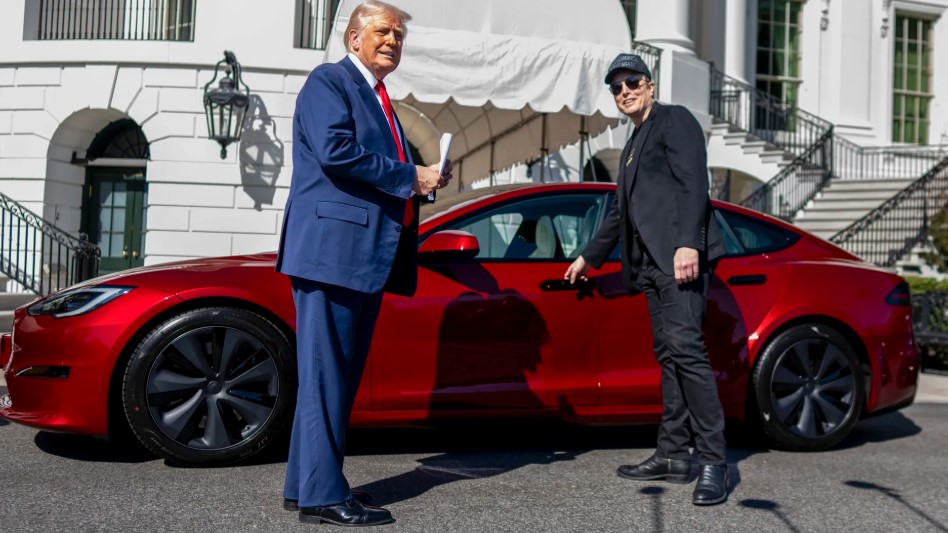In a recent statement, President Donald Trump declared that acts of violence against Tesla dealerships constitute domestic terrorism. This announcement, made during a White House event, was a show of support for Elon Musk, Tesla’s CEO and a key ally of the Trump administration. The president’s remarks came amidst a wave of protests and acts of vandalism targeting Tesla dealerships across the United States.

The Context of the Protests
The protests, referred to as “Tesla Takedown,” have been organized by activists who are critical of Musk’s role in the Trump administration. Specifically, they are angered by Musk’s involvement in sweeping cuts to the federal workforce and the cancellation of contracts that fund humanitarian programs globally. Musk, who is leading the Trump administration’s Department of Government Efficiency (DOGE), has become a polarizing figure due to his political activities.
At the White House event, Trump stood alongside Musk, who was wearing a “Make America Great Again” baseball cap, and condemned the protesters. “They’re harming a great American company,” Trump said, referring to the demonstrators. He also issued a stern warning: “Let me tell you, you do it to Tesla, and you do it to any company, we’re going to catch you, and … you’re going to go through hell.”
Legal Implications and Responses
Trump’s labeling of the violence as domestic terrorism has raised questions about the legal definition of terrorism. According to federal law, terrorism involves acts of violence intended to intimidate or coerce a civilian population or government to advance political or social objectives. Legal experts have questioned whether vandalism and protests against Tesla dealerships meet this definition. While Trump has suggested that the Justice Department could charge vandals under terrorism statutes, it remains unclear whether such charges would hold up in court.
In response to Trump’s statement, one of the groups organizing the protests issued a statement on the social media platform Bluesky. The group denied any involvement in violence and emphasized that peaceful protest is a protected right. “Peaceful protest on public property is not domestic terrorism,” the group said. “They are trying to intimidate us. We will not let them succeed.”
The Business Impact
Despite the controversy, Trump’s public support for Tesla appears to have had a positive impact on the company’s stock. Shares of Tesla closed nearly 4% higher on the day of Trump’s statement, rebounding from a significant drop the previous day. This surge came after Trump and Musk appeared together at the White House, where Trump selected a new Tesla Model S for his staff to use. The Model S, which starts at around $80,000, was purchased without any discount, according to Trump.
However, Tesla’s long-term outlook remains uncertain. The company’s market capitalization has more than halved since hitting an all-time high of $1.5 trillion in December. This decline is attributed to falling vehicle sales and profits, as well as investor concerns that Musk’s political activities are distracting him from managing Tesla effectively.
Musk’s Commitment to Tesla and Politics
During the White House event, Musk reaffirmed his commitment to Tesla, stating that the company would double its production in the United States within the next two years. “As a function of the great policies of President Trump and his administration and an act of faith in America, Tesla is going to double vehicle output in the United States within the next two years,” Musk said.
Musk also addressed concerns about his dual role as Tesla’s CEO and his involvement in the Trump administration. He told reporters that he would remain in Washington as long as he was useful but emphasized that he would continue to lead Tesla. This statement has done little to alleviate investor worries, as many fear that Musk’s political activities could further destabilize the company.
The Broader Implications
Trump’s decision to label violence against Tesla dealerships as domestic terrorism has broader implications for the interpretation of terrorism in the United States. While the president’s statement was clearly intended to show support for Musk and Tesla, it also raises questions about the limits of political rhetoric and the potential for misuse of terrorism charges to silence critics.
Moreover, the ongoing protests and acts of vandalism highlight the growing polarization in American society. As Musk and Tesla become increasingly entangled in political controversies, the company’s ability to navigate this complex landscape will be crucial to its future success. Whether Trump’s support will be enough to shield Tesla from the fallout remains to be seen.
Conclusion
In conclusion, Trump’s declaration that violence against Tesla dealerships constitutes domestic terrorism has added fuel to an already contentious debate. As the situation continues to unfold, the interplay between political support, legal challenges, and market dynamics will likely shape the trajectory of Tesla and its CEO, Elon Musk. The company’s ability to balance political involvement with business operations will be a critical factor in determining its future success in this highly polarized environment.